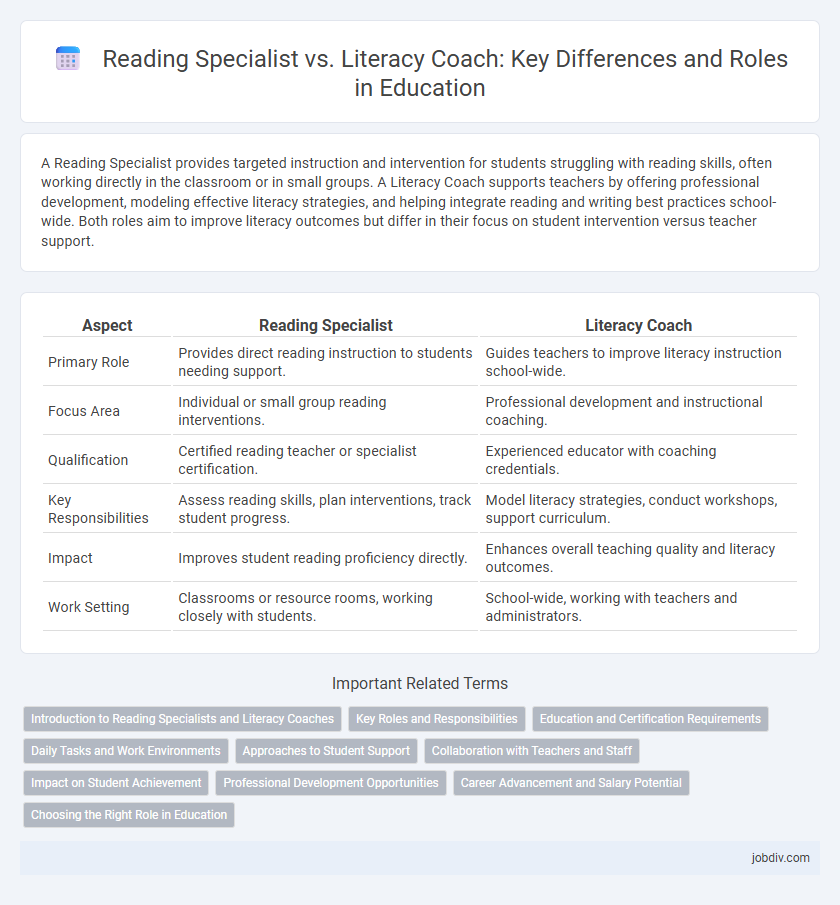A Reading Specialist provides targeted instruction and intervention for students struggling with reading skills, often working directly in the classroom or in small groups. A Literacy Coach supports teachers by offering professional development, modeling effective literacy strategies, and helping integrate reading and writing best practices school-wide. Both roles aim to improve literacy outcomes but differ in their focus on student intervention versus teacher support.
Table of Comparison
| Aspect | Reading Specialist | Literacy Coach |
|---|---|---|
| Primary Role | Provides direct reading instruction to students needing support. | Guides teachers to improve literacy instruction school-wide. |
| Focus Area | Individual or small group reading interventions. | Professional development and instructional coaching. |
| Qualification | Certified reading teacher or specialist certification. | Experienced educator with coaching credentials. |
| Key Responsibilities | Assess reading skills, plan interventions, track student progress. | Model literacy strategies, conduct workshops, support curriculum. |
| Impact | Improves student reading proficiency directly. | Enhances overall teaching quality and literacy outcomes. |
| Work Setting | Classrooms or resource rooms, working closely with students. | School-wide, working with teachers and administrators. |
Introduction to Reading Specialists and Literacy Coaches
Reading specialists focus on providing targeted support to students struggling with reading through individualized interventions and assessments. Literacy coaches work closely with teachers to enhance instructional strategies and foster professional development aimed at improving literacy instruction across classrooms. Both roles play critical parts in advancing student reading achievement and literacy outcomes.
Key Roles and Responsibilities
Reading Specialists focus on assessing and intervening with students who struggle with reading, providing targeted instruction tailored to individual learning needs. Literacy Coaches support teachers by modeling effective reading strategies, facilitating professional development, and implementing school-wide literacy initiatives. Both roles aim to improve reading outcomes but differ in direct student interaction versus educator support and training.
Education and Certification Requirements
A Reading Specialist typically holds a master's degree in reading or literacy education along with state certification specifically for reading instruction, emphasizing individualized student assessment and intervention strategies. A Literacy Coach often possesses similar advanced education credentials but focuses more on professional development and instructional support for teachers to enhance classroom literacy practices. Certification requirements vary by state, with Reading Specialists usually requiring specialized endorsements, while Literacy Coaches may need broader teaching or administrative certifications.
Daily Tasks and Work Environments
Reading Specialists typically work directly with students to assess reading levels, develop individualized intervention plans, and provide targeted instruction in school settings. Literacy Coaches focus on supporting teachers by modeling effective literacy strategies, conducting professional development, and analyzing student reading data to inform instruction, often working across multiple classrooms or schools. Both roles require collaboration with educators but differ in daily tasks, with Reading Specialists centered on student intervention and Literacy Coaches emphasizing teacher support and instructional leadership.
Approaches to Student Support
Reading Specialists utilize targeted intervention strategies and diagnostic assessments to address individual literacy challenges, focusing primarily on struggling readers within classroom settings. Literacy Coaches emphasize collaborative professional development by modeling effective instructional practices and integrating literacy across curricula to enhance overall teaching quality. Both roles prioritize student-centered support but differ in their scope of influence and methods of fostering reading proficiency.
Collaboration with Teachers and Staff
Reading specialists collaborate closely with teachers and staff by providing targeted instructional support and analyzing student reading data to inform classroom strategies. Literacy coaches engage in ongoing professional development with educators, facilitating workshops and modeling best practices to enhance literacy instruction schoolwide. Both roles prioritize fostering a collaborative culture that promotes continuous improvement in student literacy outcomes.
Impact on Student Achievement
Reading specialists directly support struggling readers through targeted interventions and individualized instruction, leading to measurable gains in decoding skills and comprehension. Literacy coaches enhance overall teacher effectiveness by providing professional development and collaborative strategies, resulting in improved classroom instruction and broader literacy outcomes. Both roles contribute significantly to student achievement, with reading specialists addressing immediate student needs and literacy coaches fostering sustained instructional improvement.
Professional Development Opportunities
Reading specialists often engage in specialized professional development focused on assessment techniques, intervention strategies, and research-based reading instruction methods to support struggling readers. Literacy coaches participate in ongoing training that emphasizes coaching skills, curriculum development, and collaborative instructional practices to enhance teacher efficacy and student outcomes. Both roles benefit from workshops, certifications, and conferences tailored to literacy education and advocacy.
Career Advancement and Salary Potential
Reading Specialists typically have advanced certifications and focus on direct intervention for struggling readers, which can lead to higher starting salaries and specialized career advancement opportunities within schools. Literacy Coaches often work in broader instructional roles supporting teacher development and curriculum integration, offering pathways into school leadership or district-level positions with competitive salary increases. Career advancement for both roles depends on credentials, experience, and the educational institution's budget, with Literacy Coaches sometimes earning higher salaries due to administrative responsibilities.
Choosing the Right Role in Education
Choosing between a Reading Specialist and a Literacy Coach depends on specific educational goals and school needs. Reading Specialists target individual student interventions using specialized assessments to improve reading skills, while Literacy Coaches support teachers through professional development and instructional strategies to enhance overall literacy instruction. Understanding roles and outcomes helps educators align expertise with student achievement and school improvement plans.
Reading Specialist vs Literacy Coach Infographic

 jobdiv.com
jobdiv.com